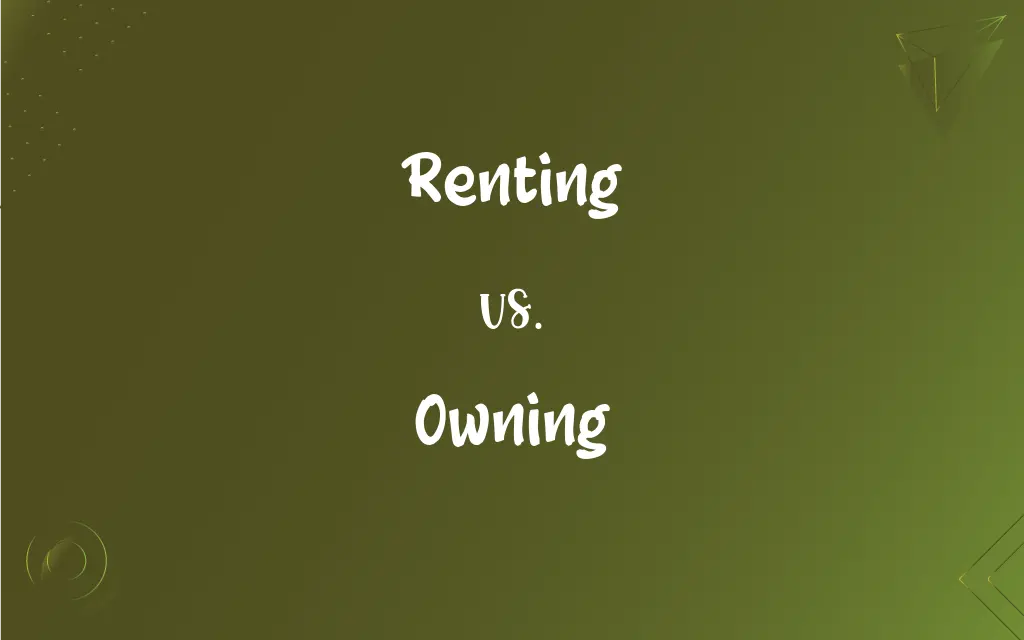Renting vs. Owning: What's the Difference?
Edited by Harlon Moss || By Janet White || Published on October 23, 2023
Renting involves paying for temporary use of an asset, while Owning means possessing the asset with full rights.

Key Differences
Renting and Owning are two financial and living arrangements widely recognized in the real estate market and beyond. Each offers a distinct relationship with the asset in question.
Renting involves an agreement wherein a person pays to use an asset, typically property or equipment, for a set duration. It's a temporary arrangement that doesn't transfer any ownership rights. Owning, in contrast, denotes having full legal rights and responsibilities over an asset, be it tangible like a house or intangible like a copyright.
The financial dynamics of Renting and Owning differ considerably. When Renting, regular payments are made to the owner or landlord, with no equity built in the asset. Owning, however, often involves purchasing an asset outright or through financing, leading to building equity over time.
With Renting, once the lease or rental agreement ends, there's no residual claim to the asset. On the other hand, Owning often represents a long-term commitment, with the asset potentially appreciating in value. Owners also bear the responsibility of maintenance and bear any risks associated with the asset.
One's decision between Renting and Owning can be influenced by multiple factors including financial standing, desired commitment level, flexibility needs, and long-term goals. Both Renting and Owning come with their unique sets of advantages and potential challenges.
ADVERTISEMENT
Comparison Chart
Relationship to Asset
Temporary use
Full possession and rights
Financial Implication
No equity built
Potential for equity and appreciation
Duration
Defined by lease/agreement
Indefinite, until sold or transferred
Maintenance Responsibility
Often with the owner/landlord
With the possessor
Flexibility
Generally more flexible
Less flexibility, long-term commitment
ADVERTISEMENT
Renting and Owning Definitions
Renting
Leasing property from a landlord or owner.
She considered Renting a larger place.
Owning
Possessing an asset with full rights.
He enjoyed Owning his own home.
Renting
Paying to use an asset for a specified time.
She's Renting the apartment until June.
Owning
Holding and controlling property or rights.
There's a sense of pride in Owning a business.
Renting
A temporary arrangement with no transfer of ownership.
Renting allowed him more flexibility.
Owning
Having legal title to something.
Owning the patent brought her royalties.
Renting
Payment, usually of an amount fixed by contract, made by a tenant at specified intervals in return for the right to occupy or use the property of another.
Owning
Bearing the risks and rewards of possession.
Owning stocks means potential gains but also risks.
Renting
A similar payment made for the use of a facility, equipment, or service provided by another.
Owning
Of or belonging to oneself or itself
She makes her own clothes.
Renting
The return derived from cultivated or improved land after deduction of all production costs.
Owning
That which belongs to one
I wanted a room of my own.
Renting
The difference between the price paid for use of a resource whose supply is inelastic and the minimum price at which that resource would still be provided. Also called economic rent.
Owning
To have or possess as property
Owns a chain of restaurants.
Renting
An opening made by rending; a rip.
Owning
To have control over
For a time, enemy planes owned the skies.
Renting
A breach of relations between persons or groups; a rift.
Owning
To admit as being in accordance with fact, truth, or a claim; acknowledge
"I own that I have been sly, thievish, mean, a prevaricator, greedy, derelict, / and I own that I remain so yet" (Walt Whitman).
Renting
To obtain occupancy or use of (another's property) in return for regular payments.
Owning
To make a full confession or acknowledgment
When confronted with the evidence the thief owned up to the crime.
Renting
To grant temporary occupancy or use of (one's own property or a service) in return for regular payments
Rents out TV sets.
Owning
Infl of own
Renting
To be for rent
The cottage rents for $1,200 a month.
Owning
Being responsible for an asset and its associated costs.
Owning an old car means more maintenance costs.
Renting
A past tense and a past participle of rend.
Renting
Infl of rent
Renting
The act by which something is rented; a rental.
Renting
The act of paying for the use of something (as an apartment or house or car)
Renting
Occupying or using space in exchange for payment.
Renting in the city center can be expensive.
Renting
Accessing an asset without purchasing it.
They considered Renting the equipment for the project.
FAQs
What happens if an Owned property depreciates?
The owner bears the loss of the property's decreased value.
Can Owning be a form of investment?
Yes, many see Owning, especially real estate, as an investment due to potential appreciation.
Can you customize a Rented property?
It depends on the agreement; some landlords allow modifications while others don't.
Do you build equity when Renting?
No, Renting doesn't build equity in the asset.
Are Renting agreements always written?
It's advisable to have written agreements, but verbal ones exist, albeit riskier.
Is it easier to relocate when Renting?
Generally, Renting offers more flexibility for relocation than Owning.
Are there risks to Renting?
Yes, such as potential rent hikes, eviction, or limitations on property use.
Is Renting always short-term?
Not necessarily; rental durations can vary from short-term to long-term leases.
Are taxes different for Renting and Owning?
Yes, tax implications can vary based on jurisdiction and ownership status.
Is Owning always better than Renting?
It depends on individual goals, finances, and circumstances; both have pros and cons.
Can Owning be financed?
Yes, many own assets like homes through financing options like mortgages.
Who handles repairs in a Rented property?
Typically, the landlord or owner handles major repairs unless otherwise specified.
What's a benefit of Owning a home?
Homeownership might offer equity building, potential appreciation, and tax benefits.
Can Owning provide passive income?
Yes, Owning assets like rental properties can generate passive income.
Why might someone choose Renting over Owning?
Flexibility, financial reasons, or lack of maintenance responsibilities might influence the decision.
About Author
Written by
Janet WhiteJanet White has been an esteemed writer and blogger for Difference Wiki. Holding a Master's degree in Science and Medical Journalism from the prestigious Boston University, she has consistently demonstrated her expertise and passion for her field. When she's not immersed in her work, Janet relishes her time exercising, delving into a good book, and cherishing moments with friends and family.
Edited by
Harlon MossHarlon is a seasoned quality moderator and accomplished content writer for Difference Wiki. An alumnus of the prestigious University of California, he earned his degree in Computer Science. Leveraging his academic background, Harlon brings a meticulous and informed perspective to his work, ensuring content accuracy and excellence.






































































